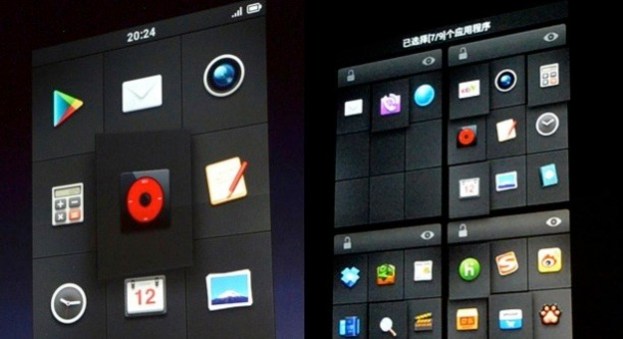
This week, a new Android-based operating system called Smartisan OS was revealed. At a lengthy event — three-plus hours long — led by CEO of Smartisan, Luo Yonghao. Yonghao spoke about, what he referred to as an unhealthy obsession, the Chinese have with iOS-esque grid-style design. He also spoke against the vast majority of icons that he insists are deformed and not recognizable; as a result — and also because he believes in a closed, controlled system — his team worked on redesigning icons to fit the look he preferred (think: futuristic). Hundreds have already been completed, with many more to come. But with a team of just 24, this will take some time.
Each icon was also stripped of any text by default, which he insists cleans up the look, though the user can enable text if they decide. In addition, he implemented larger icons on a 4 x 3 grid, as opposed to the normal 5 x 4. With a charcoal background for the icons and no visible wallpaper, we have to agree, Yonghao succeeded.
One cool feature is in the moving of icons; instead of having to drag them across multiple screens. You can zoom out and easily select which of the home screens you want to drop the icon off at. When zoomed out, you can even choose multiple icons to move all at the same time.
Beyond that, users will even be given the ability to lock certain home screens. (Embarrassing apps that you don’t want to chance people seeing? This is perfect for you!)
Some other notable features:
- Contacts can be sorted by the date you added them, where they live, and how frequently you interact with them.
- For those of you that act before you think, SMS messages are delayed by three seconds after hitting send.
- When adjusting the volume of your phone, the brightness toggle appears just below so you can easily adjust at the same time.
- Kids get ahold of your phone and now — surprise!! — your phone is in Portuguese? Flags of each country are displayed instead of text so you can easily get back to the correct language setting.
- Voice command works just by holding the phone up to your ear and speak; using a gyroscope and proximity sensor, the phone knows to activate.
- Quickly read and reply to SMS texts just via the pop-up notification.
- Have more contacts than you can keep track of? You can add a brief note to their contact information, and it will appear above their photo when they call, just in case you need a reminder.
These are all simple, but smart changes to Android, which may really help the OS take off. The first public beta testing will begin in China on June 15, but there’s no word yet when, or even if, it will ever make its way to the United States.
Editors' Recommendations
- The 10 best photo editing apps for Android and iOS in 2024
- How to use ChatGPT on an iPhone and Android phone
- Using an Android phone showed me just how bad iOS notifications really are
- I thought iOS 16 would ruin my iPhone 8, but it shocked me
- The best walkie-talkie apps for Android and iOS

